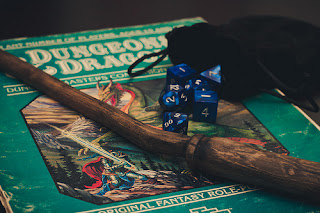"You push the heavy, wooden door and it opens slowly, hinges screaming into the silence of the dark corridors around you."
"Great," says Adam, looking at Chris who plays the impatient Fighter. "I told you we should check the door before opening it. My Thief would have noticed the rusty hinges!"
"What's the matter?" replies Chris with a smile, "afraid from the dark?"
(The players look at the Dungeon Master, who rolls some dice behind his DM's screen)
"The echoes of the hinges shriek slowly fade away. The chamber behind the door is dark."
"I push my way forward, and use my torch to light up the room," says Ron, who play the Cleric. "What do I see?"
"The room is filled with old crates covered with dust. The air is dry and cold. A pile of rags rests on one of the crates."
Sounds familiar? How many similar scenes you have played throughout your gaming career? Dozens? Hundreds?
99% of what we do around the table is all about Dialog. We speak. We describe our characters actions. We ask the DM questions. We debate rules, options and tactics. We role-play, we argue, we socialize.
Think about your last session. How much of the dialog was between one player and the DM? How much of it was between one player and another? In my humble opinion, almost all dialog around the table (game related, that is) is between one or two players and the DM. I can count on one hand the number of player vs player moments per session I had throughout my entire DMing career. And I had (and still have!) some great players around my tables throughout the years.
Why is that so? Well, most players assume that the DM, being the one running the game, has all the answers. Even if the DM is running a pre-make module published for one official setting or the other, he still have absolute control of the happenings, so it's only logical to direct all questions to him. Moreover, the DM is the guy playing all the NPCs, so if an NPC comes and presents himself, it's only logical for the players to engage with him - and the DM, as a result.
This way, players go through whole sessions ping-ponging with the DM, with only occasional breaks to discuss something with their fellow players.
What a waste!
Players drive the story, not the DM. It's something I repeatedly say to every group I run games for, and with good reason. The collective mind of 6 people (5 players and a DM) can blow away anything a single DM can do. Think about it - a game run by the DM is railroaded by definition. The DM makes the calls, the DM decides where the story goes. Players make choices, no doubt, but at the end, it's the DM who orchestrate the story, making the game a series of "left or right" decisions in a scripted story.
As I said - a waste.
As I wrote in my last Campaign Workshop post, I ask my players to write backgrounds for their characters, and then I use it to create the story of the campaign. But how can these backgrounds come to life unless the players talk to each other? If the players don't share with one another bits of their backgrounds during the course of the campaign, when these backgrounds come to life in the form of events or NPCs, no-one other than the background writer have any idea what's going on, and it's a waste, because that moment is a private moment between the player and the DM.
I believe that any role-playing game can benefit from scenes in which characters engage in a dialog that excludes the DM. One can start it, the others can follow if they like and make their characters come to life within the story. It doesn't need to be an award-winning, actor's studio moment full of emotion and Shakespeare-like prose. Two or three sentences between several characters is all it takes, and it might lead to interesting scenes and "ah-ha" moments later on during the campaign.
Think about the following example:
After a gruesome fight with Gnolls, the players hear Chris (playing the Fighter) describe how he wipes the blade clean on one of the corpses with a nasty smile.
If you were a player in that group, how would you respond? Would you ignore that role-playing opportunity, or would you "pick up the glove" and say something like "You really enjoy it, do you? Where on earth do they teach the love of war?"
photo credit: Sharon Drummond via photopin cc


No comments:
Post a Comment